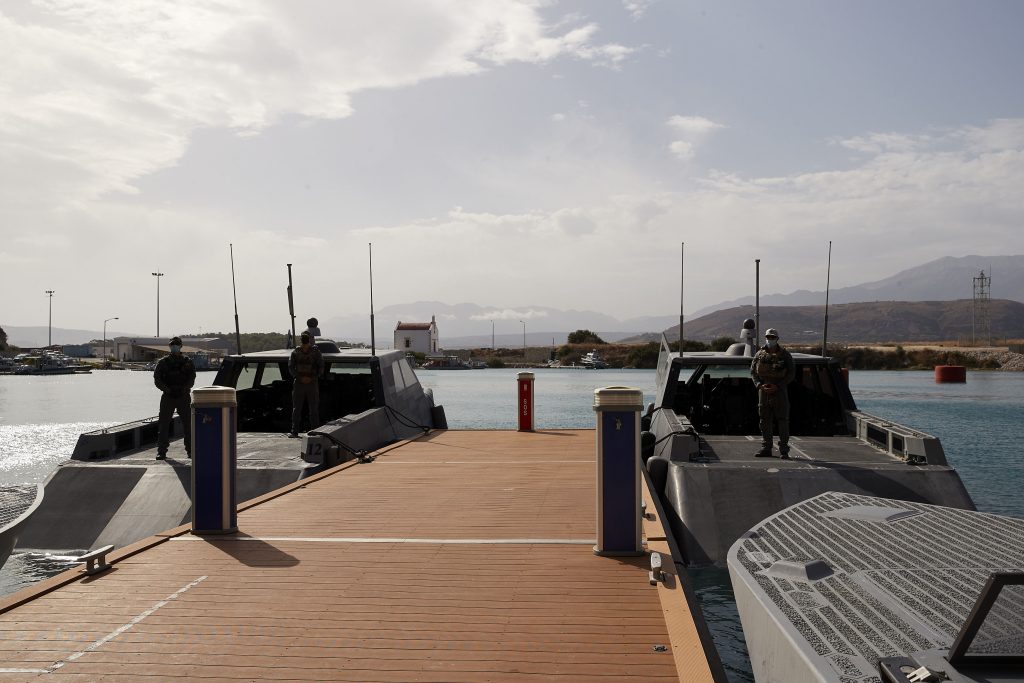A bipartisan group of lawmakers introduced legislation this week in the House of Representatives aimed at deepening U.S. security cooperation with Greece, Cyprus, and Israel.
The proposed legislation, titled the American-Hellenic-Israeli Eastern Mediterranean Counterterrorism and Maritime Security Partnership Act of 2025, was introduced by Rep. Nicole Malliotakis (R-N.Y.) and co-led by Reps. Thomas Kean Jr. (R-N.J.), Dan Goldman (D-N.Y.), and Josh Gottheimer (D-N.J.). It aims to bolster collaboration on counterterrorism and maritime security, while formalizing the 3+1 framework as a platform for long-term strategic cooperation.
The bill comes amid renewed geopolitical activity in the Eastern Mediterranean and growing interest in reviving the 3+1 partnership—bringing together the United States and the three regional allies—at a higher political level. It also coincides with deliberations by the U.S. International Development Finance Corporation (DFC) to join the Greece-Cyprus-Israel electricity interconnection project, a significant energy infrastructure initiative in the region.
The new legislation marks the third major bill of Greek interest to reach Congress in seven years, following the Eastern Mediterranean Security and Energy Partnership Act of 2019 and the U.S.-Greece Defense and Interparliamentary Partnership Act of 2021. Lawmakers hope this new initiative will build on the momentum of those earlier efforts and further institutionalize U.S. engagement in the region.
The legislation is written to align with both the bureaucratic efficiency outlined by the newly established Department of Government Efficiency (DOGE) and the evolving defense priorities of the Trump administration.
Core Provisions of the Bill
At the heart of the bill are several initiatives aimed at institutionalizing security cooperation among the United States, Greece, Cyprus, and Israel. It calls for the creation of a maritime security training program, known as TRIREME (Training and Readiness Initiative for Regional East-Mediterranean Maritime-Security Enforcement), based at the Greek naval base in Souda Bay, Crete.
A parallel counterterrorism training program, CERBERUS (Counterterrorism Education for Readiness Building in the East-Mediterranean Region to Unify Security), would be established at the CYCLOPS (Cyprus Center for Land, Open-seas, and Port Security) training center. Both programs are slated to receive dedicated funding from the Pentagon and would be available for participation from all four countries.
In addition to the training programs run by Department of Defense, the bill authorizes $5 million in fiscal year 2026 for the development of maritime security training infrastructure and the purchase of maritime security equipment at Souda Bay, which will be given to Greece. An additional $5 million is authorized for expanding counterterrorism facilities and resources at the CYCLOPS training center, which will be given to the Republic of Cyprus.
Both Greece and Cyprus will also be authorized to receive $2 million from FY26-FY29, with Greece’s funds authorized to support the new maritime security training facilities at Souda Bay created through this bill, and Cyprus’ funds authorized for the general support of CYCLOPS.
The legislation also seeks to end the requirement for the annual review and lift of the U.S. arms embargo on Cyprus by amending longstanding statutes to eliminate the embargo altogether. Additionally, the bill would strengthen the existing 3+1 framework by creating new inter-parliamentary and inter-executive security sub-groups and new security cooperation strategies.
Finally, the bill authorizes increases for funding the International Military Education and Training (IMET) program, with $4 million allocated to Israel and $1 million each to Greece and Cyprus over the next four years.
Training and Strategic Development
The TRIREME program, which would be implemented by the U.S. Department of Defense, would be authorized $1.5 million annually from fiscal years 2026 to 2029. Additionally, the bill earmarks a one-time $5 million investment in 2026 to build new maritime security training infrastructure and acquire specialized maritime training equipment, with an additional $2 million per year allocated to support these upgrades, all of which will be given to the government of Greece.
The CERBERUS program, aimed at enhancing counterterrorism training capabilities, would similarly be implemented by the U.S. Department of Defense, and would also be authorized $1.5 million per year over four years. Another $2 million authorized annually for four years would be directed toward improving the general operations of the CYCLOPS center, with an additional $5 million authorized in fiscal year 2026 for new counterterrorism training construction and equipment procurement, all of which will be given to the government of the Republic of Cyprus.
Additionally, the U.S. Secretary of Defense and Secretary of State would be tasked with providing a briefing annually to Congress on program outcomes. They also will be developing long-term strategies for counterterrorism and maritime security cooperation under the 3+1 structure that goes beyond training.
Lifting of Cyprus Arms Embargo
A significant provision in the bill seeks to eliminate the requirement for the annual review and lift of the U.S. arms embargo on Cyprus, which was formally allowed to be lifted on a yearly basis in 2020. Under current law, the lifting must be re-certified each year by the administration, based on compliance benchmarks related to financial transparency and security cooperation. The proposed legislation would remove the embargo altogether, making the lifting permanent.
Strengthening the 3+1 Framework
The legislation would eliminate the expiration clause of the U.S. Interparliamentary Group established in 2021, making it permanent and expanding it through a dedicated security subgroup of six U.S. Senators and six U.S. Representatives. Additionally, it creates a security inter-executive group composed of an officer from the U.S. Departments of Defense, State, and Homeland Security. Both of the new security groups would convene with their Greek, Cypriot, and Israeli counterparts at least twice a year to discuss security cooperation with Greece, Cyprus, and Israel.
Boost to Military Education
Authorized funding for the IMET program would rise under the proposal, with Israel receiving an additional $1 million annually over the next four years, and Greece and Cyprus each receiving $250,000 annually in new funding during the same period. The IMET program facilitates the training of foreign military personnel in U.S. institutions, aiming to enhance interoperability and build long-term strategic relationships.
Outlook and Legislative Path
A corresponding version of the bill is expected to be introduced in the Senate in the coming weeks. As is the case with most new defense programs, it is expected to be incorporated into the National Defense Authorization Act (NDAA) later this year, and will require a separate appropriations component to allocate the funding it authorizes.
Advocacy and Support
The legislation was initiated by the American Hellenic Institute (AHI). In a statement, AHI praised the proposal as “a critical next step” in enhancing security coordination in the Eastern Mediterranean.
“The American Hellenic Institute has been a longtime advocate of the importance of the “3+1” partnership between Greece, the Republic of Cyprus, Israel, and the United States,” the institute stated. “It is a powerful regional cooperation structure that should be utilized to the fullest extent to protect America’s interests, secure its international commerce, and to provide peace, stability, and safety in an area of great geopolitical importance.”





